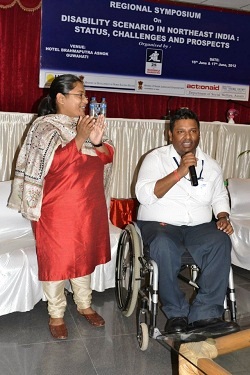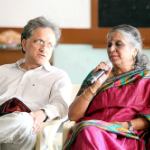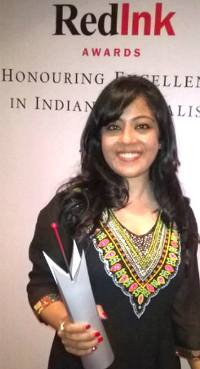Poetry Editor ANANYA S GUHA's note:
''Nabina Das's poems are evocative, deeply sensuous with a splash of colours. There is a liquid movement in the poems. She explores the past, history and personal myths. Nabina's use of language is exploratory and rhythmic. These poems are beautiful recapitulations of the past, infused with present moments. Nabina is an exquisite crafts person. Her invocation of the Brahmaputra is prayer like - of the river's history. This is her cultural landscape as history seeps through time and again in her poems, at the same time imbued with ringing personal notes.''
Find us on facebook: facebook.com/TheThumbPrintMag
The River on a Pyre
Eyeing the Brahmaputra
Flowing with its whale-body
And the faraway banks smoking
She thought death stood quiet.
Quietly performing the ritual
Of mouth-fire for her own for
The bodies that once talked
Laughed and spread guile.
Eyeing the strong-arm river’s sweep
Carrying unsuspecting dolphins
And last night’s smoky limbs
From the pyres she watched
Across her verandah over the
Monsoon’s damp dribble.
She searched out the smell
Ashes in the wind stuck
Like the stunned river’s pride
The look of a living face
smoke-screened in twilight.
Finding Foremothers
This is a day the family sits down
to a dinner for a festival remembering
ancestors they say hover disguised as
birds and animals – on the lawn, on garden boughs.
Is my grandma among the cows?
I knew she was feisty. Maybe
a crow then. And her own mother
was she there too with her broken
teeth and sad robes yellowed with
age in a photograph some white man had
clicked at her rich spouse’s gracious permission?
The sweetened tomato chutney on
my banana leaf plate seeping away like blood
dark dark red, blood of aunts, wives
who cooked and cleaned, sucked
blood from cuts, bore kids and bled till
they stopped, bled in their hearts when widowed and denied.
A few grains of paddy, holy water, forefathers still
flocked outside, on the television a woman wails
I flip through an old photo album, sepia, forgotten clutter.
Sem(a)ntics
Dear Europa,
a letter seems the best way to say how I wish to get
inside your ancient catacombs and modern plazas once again, be a good
Zeus this time, friends to the mythical queen, in your florid cities.
Amstel dam
shakes my hand with the wind weaving my hair on Dam
Square; we can’t go fishing anymore like they did in the 12th Century
before hopping on to the Dutch Golden Age when you showed off your
new blood diamonds; now your neighborhoods gesture, flash Rosse Buurt
on my shamed eyes and in your coffee shops of languor you sleep in peace.
History is
a lover never loved or known. Your history, Paris, coaxes me
to call you "The craftsmen" of the heart as you pout: Moi j’suis d’Paname.
So take your lights, drunken squares, amorous nicknames hunched over
horsemen and whores crowding my eyes, lead me on with your soft
consonants trilling and tripping, try explain why you’d rather have the world
bring you bouquets of ideas, mirth, and still say: Moi j’suis d’Paname!
I do know
the Bonn joke outsiders like to make, historians too because they see
the truth in a relatively innocent way, no harm meant: Bundeshauptstadt
ohne nennenswertes Nachtleben! I’ll leave the translation to someone else,
drink Kölsch in noisy gulps, also laugh to the safer joke that Kölsch is the only
language one drinks in Cologne, the other non-drinkable being my brown sahib
grandpa’s imported odikolon, a habit dad picked up, he a rebel with good taste.
Evening Things
5 p.m. The trees invite blue china clouds
They forget the sun cannot light the lamp
5 p.m. You are drinking tea with honey
Inside a penumbra by the Radhachuda tree
You can wait, then bring the oil lamp out
Circumnavigate the non-existent tulaxi
The Namghar’s 5 p.m. silence will soon erupt
Its tranced kortaal dueting with the khol
5 p.m. You will know that time has struck
Gooseberry dreaming the shadow of a home.
Luit on our Tongues
We were five or six, men and children
In a tempo, that rackety raucous vehicle
With three capricious wheels heading
Towards Sonitpur, our vacation, where
Mangoes had ripened summer’s belly with
The monsoon’s heavy showering grace
The usual route was flooded, abandoned
Luit had licked it wet, fungal, even after
The water receded; this was our Old Luit
Father kept telling me how the Red River
Has its liquid name from the colour red
After a battleaxe washed itself, lots of blood
Now there are bridges that drown currents
Hurrying us in buses and cars in a riverine flow
The Bodo teacher sitting just next to us said
The river does actually speak the curious hue
In gurgles by his village sweeping in a chant
Bhullum-buthur.He smiled. Bhullum-buthur
Bubbles in the head, the mad water’s dance
The Brahmaputra in news and TV he knew
It still gurgles day and night, another man said
Like human voices when slashed, when spent
Gasps bhullum-buthur in river tongue, the dead
So did our Luit, took stories along and lives
Between conversations from the diverted route
We saw the faraway river gone red-eyed with mud
The blood all faded, perhaps the colour of the red-
ness entrenched like the leftover evening sun.
Goodbye to Ballimaran
I’ve heard about riled up days that despised names of verses
they preferred riding jaunty jeeps through the old town
earlier than the rooster, stopping for certain numbered doors
Possibly those sweaty days turned swear words into Molotovs
singed bamboo screens drying after summer’s whimsy and rain
left a few blackened posts under roofs where couplets lived
Possibly I imagined my footsteps would precede yours there
even now, waiting, a tender pastured horse munching rhymes
your leftover half-ghazals, their florid maktas, for this was love
Didn’t Ghalib live here? My rickshaw man pedaled and smiled
He bought his quarter peg here every evening, walked from there!
No wonder I imagined your beard hair on the banister, wind-tangled
If you still exhaled behind that cindered verandah I would not know
holding broken bangle pieces of a departed love, post intermission
Alvida, you must’ve said in a sad refrain, adding in English, “So long”.
*All of the above poems are included in Nabina’s forthcoming second collection INTO THE MIGRANT CITY, Writers Workshop







































